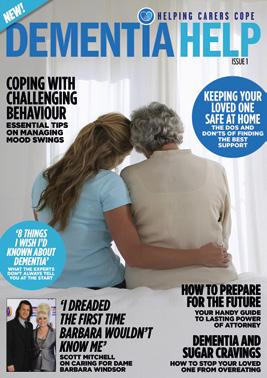
5 minute read
Empowering Carers of Loved Ones with Dementia
If you're caring for a loved one with dementia, you're not alone. Former Editor Christina Neal went through the same experience with her late mother. She's used her knowledge to create Dementia Help, a free magazine packed with advice for carers. Christina shares her background and top tips to reassure you that there is help and support.
Mum was my dad’s full-time carer in his final months. When he passed away, mum’s problems became more apparent. She lost her sense of purpose, and her memory issues and confusion worsened. She seemed to deteriorate without a focus and a reason to get up in the morning.
Advertisement
The day I knew that mum’s confusion was more than old age was when she called me and asked if I’d taken her car. I lived more than an hour away and had my own car. Mum had driven to the shops and walked home, forgetting she’d taken her car. We found it outside the local store the next day.
After various tests, mum’s diagnosis of vascular dementia was confirmed. Her GP told me not to let her live alone for too long and handed me a flimsy leaflet. We were given minimal support, and I learned about dementia through experience. In essence, there were so many things I wish I’d known in the beginning.

Like many people, I’d assumed dementia was mainly about memory loss. However, it affects much more than memory. Dementia impacts a person’s moods and behaviour. Apart from causing mood swings and depression in some people, dementia can also affect their ability to make judgements or decisions, and they may lose confidence and self-esteem.
In addition, a person with dementia can suffer from problems with spatial awareness, struggling to judge gaps between furniture, and their mobility can eventually suffer. They may also struggle with sight. A person’s eyesight can be fine, but as the brain processes what we see, they may fail to recognise objects or people, even ones they know well.
Anyone caring for a loved one with dementia will benefit from learning more about the condition. Preferably early on when a loved one is first diagnosed. There’s very little help and support for Britain’s 700,000 carers.

My mum passed away in 2016. Several months later, friends asked me for advice on caring for a parent with dementia. I began answering their questions through Facebook Messenger. Then I realised it would make more sense to set up a page with advice for family carers. I launched Dementia Help as a Facebook page in early 2017. The page followers grew rapidly, which highlighted to me the extent of the problem. When caring for my mum, I often felt isolated and alone. Many page followers felt the same, so I launched the Dementia Help website and posted regular blogs offering advice and support.
Several months ago, I decided to take things a step further and launch Dementia Help magazine. As a former magazine editor, it felt like a natural next step.
The first issue came out on 12th May, ahead of Dementia Action Week. I was thrilled with the amount of support. Many people who commented on the magazine on social media have described it as “much needed”. Dementia is not going away overnight. While encouraging steps are being made with new medications, many people will still be caring for their loved ones for many years to come.

Having learned about dementia the hard way, I’d say several key things to anyone looking after a loved one. Here are my top tips:
Stick to a Routine
Routine helps maintain familiarity and makes for a more comfortable environment. Try to keep to a consistent schedule whenever possible.
Distract and Deflect
If the person becomes frustrated or angry, try changing the subject to distract them. For example, offering a cup of tea or commenting on the weather can do wonders.
Always Agree
Correcting someone with dementia will only lead to frustration. It's best to agree with them, even if they say something you know is incorrect.
Avoid Crowds
Large groups and noisy environments can be overwhelming. Keep social occasions peaceful and ensure that only a few people surround the person at a time.
Engage the Person
Include them in conversations and social activities. Treat them normally.
Make the Most of Good Days
Encourage them to be active and social on days they feel good. This will promote happiness and fulfilment.
Encourage Exercise
Activity can improve mood, prevent mood swings, and improve overall health. Seated exercises are a great option if walking is not possible.

Don’t Try and Cope Alone
As dementia progresses, the person will become increasingly dependent on you. Build a support network around you so that you can cope. If other family members don’t do their bit, help can come from friends, neighbours and professional carers.
Finally, download your free copy of Dementia Help magazine, which is packed with advice and information on all aspects of dementia, including coping with daily care to planning and Lasting Power of Attorney.
Download your free copy from the Dementia Help website at:

https://dementiahelpuk.com/magazine/
More Information
Christina Neal is an award-winning writer and editor and the former editor of Women’s Fitness and Women’s Running magazines.
She has also written six books. You can email her at christina@dementiahelpuk.com










